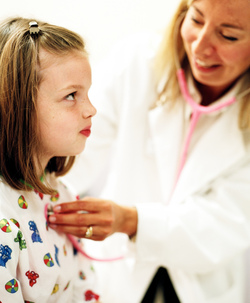New 'Public Health Certificate' program stretches across disciplines
 |
Fort Worth, TX
10/30/2008
By Rachel Stowe Master ’91
In a world where health concerns range from AIDS to aging, flu pandemics to health care cost panics, public health is becoming more critical. The Institute of Medicine of the National Academy of Sciences now recommends that “all undergraduates” have access to public health education, sparking a national movement toward establishing public health education programs at the undergraduate level.
TCU is ahead of the curve with a multidisciplinary effort to create an undergraduate public health certificate, a nine-hour program that could be launched as early as fall 2009.
“Public health is really important because it’s about how human biology interacts with multiple environments. When I use the word environment, I don’t just mean physical environment — I also mean social, political, cultural, economic and policy,” said Dr. Pamela Frable, ND RN, associate professor and associate dean and director of nursing. “A lot of what turns out to be our lived health has to do with choices we make. Different people have different opportunities to make choices, and it has a lot to do with where we happen to live, what our values are.”
During the presidential election, much of the focus turns toward health care — but that’s just a tiny piece of the health puzzle. “The biggest thing we could do to change the health of the nation is to make sure we have everybody physically active every day, eating according to the guidelines, having a healthy weight, having a safe place to live, having clean water and clean air — that would do more than focusing on the high-tech sickness care system,” Dr. Frable said. “And in this whole discussion of the election, there has not really been a conversation about making us a healthy nation in order for us to save money and to have a better quality of life. People with public health knowledge could be having that dialogue.”
Dr. Frable is part of an undergraduate public health education committee that includes Lyn Dart, PhD, RD, LD, associate professor and director of the Food Management Program; Donald W. Jackson, Herman Brown professor of political science and director of the Center for Civic Literacy; James Riddlesperger, professor and political science department chair; and Linda Martin, a clinical instructor in the Harris College of Nursing & Health Sciences. Community partners include Lou Brewer, director of the Tarrant County Public Health Department, and Richard Kurz, professor and dean of the University of North Texas Health Science Center School of Public Health.
While UNTHSC offers graduate and doctorate level study in public health, TCU’s would be the first undergraduate public health program in the Fort Worth/Dallas Metroplex.
“At some time it would be nice if our undergraduate program could dovetail into their [UNTHSC’s] graduate program,” Frable said.
TCU’s program will begin with a public health certificate that will require three classes, Public Health 101, Epidemiology 101 and Global Public Health 101.
Dr. Dart said the courses would be ideal for all majors, all minors.
“It will have applications in the way it’s taught for all disciplines. The fact that it says ‘health’ in there does not exclude it for the student who doesn’t have a major related to health because the health part would be the health of the student, that individual health, as well as just in general across the public.”
In addition to exposing students to career opportunities in public health, the courses could also benefit nonhealth-related majors — perhaps ultimately increasing their job opportunities and marketability.
“It kind of enlarges their knowledge base of their major, one more dimension of it, carrying it into a whole other area,” Dr. Dart said.
“I hope eventually we’ll have a minor,” Jackson said. “I think the first level is simply raising awareness. I hope that some students, by having their awareness raised, will choose a career that involves public health.”
If student response justifies it, the program could expand to a minor and ultimately a major — meaning undergrad public health would be incorporated at multiple levels and disciplines.
“An idea comes at its own time. And I think it’s one of those ideas,” Dart said. “Enough different disciplines see the value in it and see the value for our students for their future.”
“Our undergraduate program is supposed to be about liberal education,” Dr. Frable noted. “The word ‘liberal’ in liberal education means educated for freedom. For our nation to really fulfill its destiny of being a democracy in which people can make a difference in their lives and in other lives, people need to understand something about public health.”
She added: “I should mention it’s also fun.”










